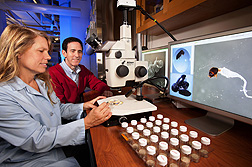| Read the magazine story to find out more. |
|
|
How Coffee Berry Borers Survive on Caffeine
By Dennis O'Brien
December 8, 2015
A U.S. Department of Agriculture (USDA) scientist and his colleagues have discovered what allows the world's most devastating coffee pest, the coffee berry borer, to survive on a caffeine-rich diet that is lethal to other insects: the bacteria in its gut.
The findings by Fernando E. Vega, an entomologist with USDA's Agricultural Research Service (ARS), and Javier Ceja-Navarro and Eoin Brodie, who are with the Department of Energy's Lawrence Berkeley National Laboratory, are good news for coffee drinkers. They provide a new target for developing strategies to manage a global pest that can cut yields by up to 80 percent and cost growers in Brazil up to $315 million annually.
Coffee generates $46 billion in U.S. sales each year in supermarkets, restaurants and shops, and an estimated 78 percent of U.S. adults drink coffee at least occasionally.
Vega and his colleagues analyzed coffee berry borers from seven coffee-producing regions (Guatemala, Hawaii, India, Indonesia, Kenya, Mexico and Puerto Rico), as well as from Vega's laboratory-reared colony in Beltsville, Maryland. They removed the digestive tracts from the tiny beetles and placed them in a caffeine-rich medium, where only bacteria that degraded caffeine would survive, to see which bacteria would grow. Scientists found 14 bacterial species that degraded and detoxified caffeine were present. One of those species, Pseudomonas fulva, was the most prevalent.
To confirm that the bacteria degrade caffeine, Vega and his team gave the beetles an antibiotic to wipe out the bacteria and fed those beetles a diet based on coffee beans. The caffeine passed through the beetles' digestive tracts intact, without degrading, but their capability to produce eggs and larvae declined 95 percent. The scientists then added the caffeine-digesting P. fulva bacteria back into the beetles' diets and found that their feces were devoid of caffeine, which showed that the bacteria are key to the detoxification process.
The study, published in Nature Communications (July 2015), was the first to explore the gut contents of the coffee berry borer. A team led by Vega also recently published a study in Scientific Reports (July 2015) mapping the pest's genome. Taken together, the efforts could lead to new pest management strategies.
ARS is USDA's principal intramural scientific research agency.
Read more about this research in the December, 2015 issue of AgResearch.

